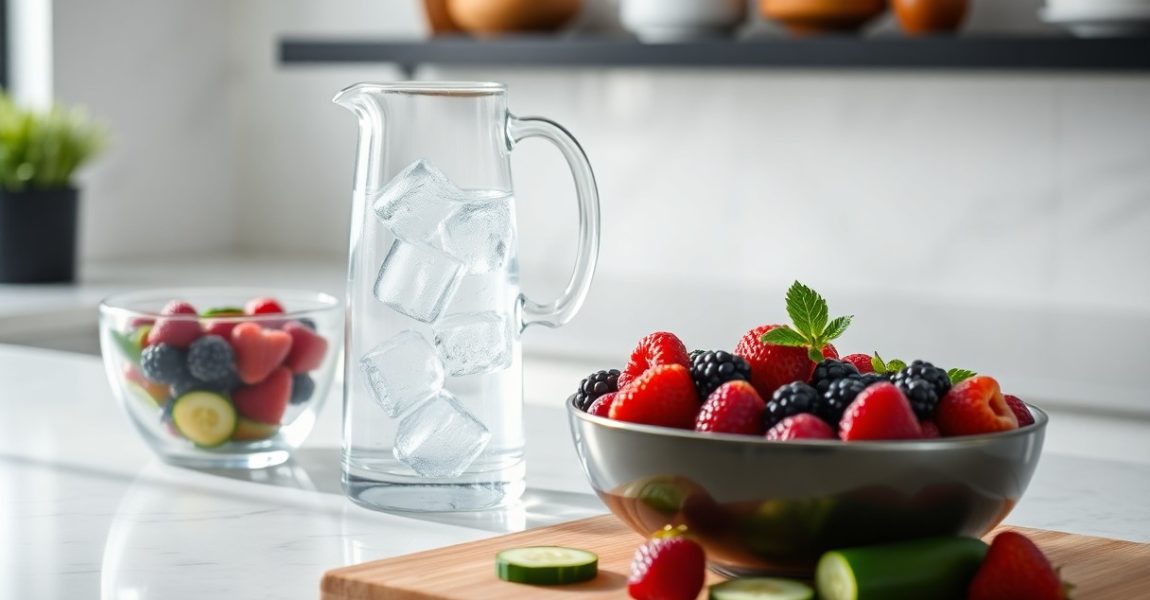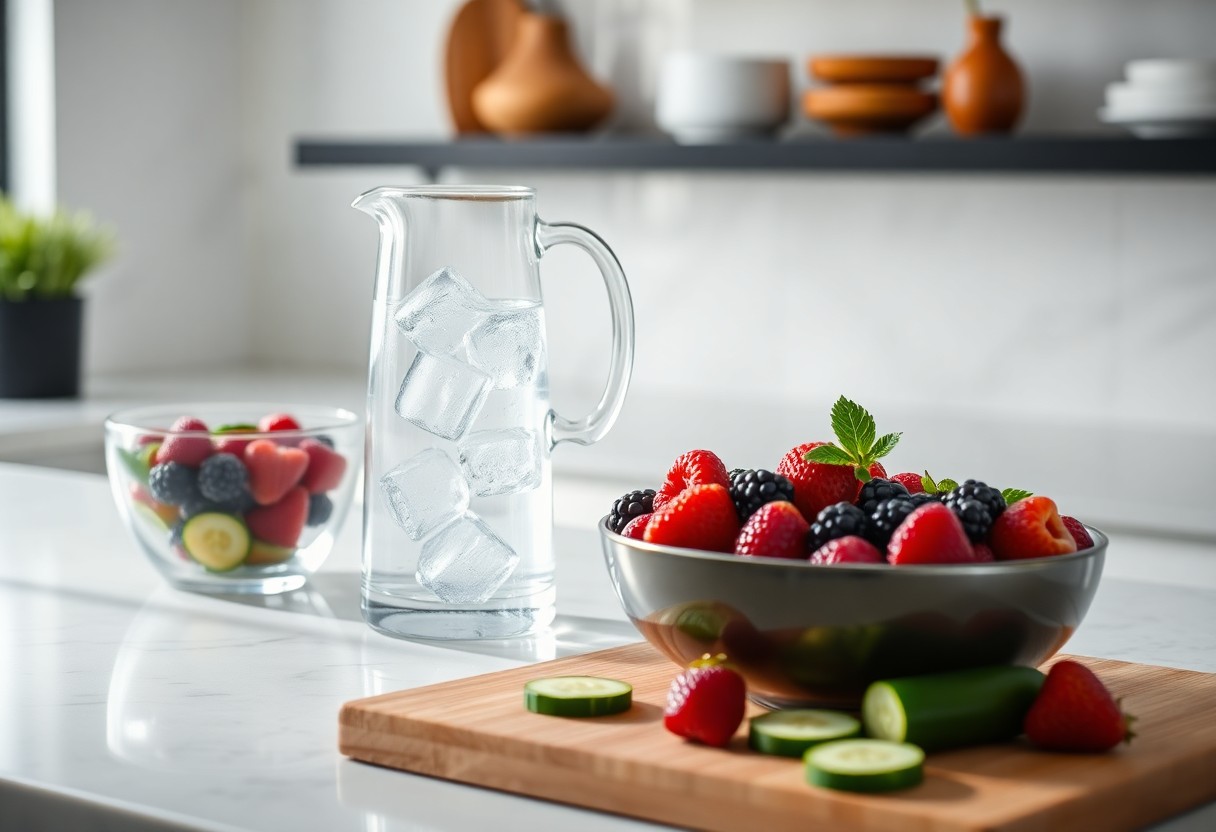
Just staying hydrated can significantly impact your cravings for sugar. Often, when you feel those intense cravings, your body might actually be signaling that it needs more water instead of sugary foods. By increasing your water intake, you can help curb these urges, maintain balanced energy levels, and support your overall health. Understanding the connection between hydration and sugar cravings can empower you to make better choices and improve your well-being. Stay refreshed with pure mineral water—its natural minerals not only hydrate you but also help curb sugar cravings by keeping your body balanced and satisfied
Contents
- 1 The Sugary Trap: How Dehydration Fuels Cravings
- 2 The Science of Hydration: More Than Just Thirst
- 3 Implementing Hydration Habits to Curb Sugar Cravings
- 4 The Long-Term Benefits of Staying Hydrated
- 5 Transforming Your Relationship with Food: Water as Your Ally
- 6 Conclusion
- 7 FAQ
- 7.0.1 Q: How does staying hydrated impact sugar cravings?
- 7.0.2 Q: Can drinking water curb my desire for sugary snacks?
- 7.0.3 Q: How much water should I drink to help prevent sugar cravings?
- 7.0.4 Q: Are there specific times when drinking water can help reduce cravings?
- 7.0.5 Q: Can I substitute drinks that contain sugar with water to help manage cravings?
Key Takeaways:
- Increased water intake can help maintain proper hydration, which may reduce feelings of hunger and subsequent sugar cravings.
- When the body is dehydrated, it can misinterpret signals of thirst as cravings for sugary foods, leading to unnecessary snacking.
- Drinking water before meals may promote a feeling of fullness, potentially decreasing overall food consumption and sweet cravings.
- Keeping hydrated can enhance mood and energy levels, reducing the desire for quick energy boosts commonly found in sugary snacks.
- Substituting sugary drinks with water can significantly cut calorie intake, helping to stabilize blood sugar levels and diminish cravings.

The Sugary Trap: How Dehydration Fuels Cravings
The Connection Between Dehydration and Sugar Cravings
Dehydration can have a surprising effect on your appetite, often leading to those pesky sugar cravings that seem to come out of nowhere. When your body is running low on water, it can easily misinterpret signals, interpreting thirst as hunger. A study published in the journal *Nutrition* found that even mild dehydration can trigger feelings of hunger and cravings for sugary snacks, especially when you’re stressed or fatigued. This often leads you to reach for that quick fix—a sweet treat—rather than a glass of water, exacerbating the cycle of cravings. Beat sugar cravings on the go with our crisp 500ml mineral water—perfectly sized to keep you hydrated, energized, and naturally satisfied anytime, anywhere
Additionally, sugar can provide immediate energy and satisfaction, which might make it an appealing option when you’re dehydrated. Instead of adequately addressing the root cause of your cravings—your body’s thirst—you may find yourself consuming empty calories that only temporarily ease your hunger but fail to provide the hydration you truly need. This relative underconsumption of water sets off a feedback loop, where dehydration drives you to eat more sugary foods, which in turn can lead to further dehydration due to the diuretic properties of sugar.
Physiological Responses: Why Your Body Craves Sugar When Thirsty
Your body’s physiological responses to dehydration may explain why sugar cravings become more pronounced when you’re thirsty. When hydration levels drop, your brain activates the hypothalamus, which increases cravings for quickly digestible sources of energy. With sugar being a readily available option, you might find yourself gravitating towards sweets, thinking you’re hungry when in reality, your primary need is water. This misinterpretation of signals can lead to overeating and can even contribute to weight gain over time.
In addition, dehydration affects the balance of hormones such as cortisol and ghrelin that regulate hunger. Elevated cortisol levels can increase feelings of stress, prompting you to seek comfort in sugary snacks. Moreover, low levels of hydration can reduce the plasma volume in your bloodstream, affecting how your body metabolizes sugar and leading to fluctuating blood sugar levels that only intensify those cravings.
The Science of Hydration: More Than Just Thirst
The Role of Water in Metabolism and Energy Levels
Your body’s metabolic processes heavily depend on adequate hydration. Water is a key component in various biochemical reactions, including the conversion of food into energy. Without sufficient water intake, metabolic rate can slow down, making it harder for you to burn calories efficiently. In fact, studies indicate that even mild dehydration—a loss of just 1-2% of your body weight—can lead to a noticeable decrease in your metabolic rate.
<pMoreover, hydration influences your energy levels throughout the day. When water levels are low, your body attempts to conserve its energy, which can lead to feelings of fatigue and lethargy. This lack of energy can prompt you to reach for quick energy sources, often in the form of sugary snacks or drinks. By ensuring you’re drinking enough water, you might notice an improvement in your overall energy, potentially reducing your reliance on sugary foods to sustain your activity levels.
How Sufficient Water Intake Affects Brain Function and Mood
Your brain is composed of nearly 75% water, making hydration necessary for cognitive function. When you’re even slightly dehydrated, your brain can experience a decline in performance, including difficulties with concentration, attention, and mood regulation. Studies have shown that just 2% dehydration can result in increased feelings of anxiety and fatigue, which may lead you to seek comfort in high-sugar foods for a quick dopamine boost.
Implementing Hydration Habits to Curb Sugar Cravings
Practical Tips for Increasing Daily Water Intake
Incorporating simple habits into your daily routine can dramatically increase your water intake. Start by keeping a refillable water bottle within reach at all times; having it in sight can remind you to take sips throughout the day. Setting specific times to drink water, such as after every meal or while waiting for something, can help establish a pattern. You might also try infusing your water with fruits or herbs to make it more appealing, transforming plain hydration into a tasty experience that encourages you to drink more.
- Fill a large bottle with water in the morning and challenge yourself to finish it by day’s end.
- Use a hydration tracking app or reminder alarms on your phone to prompt you to drink.
- Opt for water-rich foods such as cucumbers, watermelon, or oranges as part of your snack options.
- Start meals with a glass of water; this not only hydrates but can potentially limit over-eating.
- Add a splash of lemon or lime to your water for an invigorating taste.
Recognizing that every little bit counts can empower you to make hydration a priority, ultimately helping to reduce those pesky sugar cravings.
How to Identify Thirst Versus Hunger Signals
Differentiating between thirst and hunger can be challenging, yet it’s imperative for managing your cravings effectively. Many people mistake mild thirst for hunger, leading to unnecessary snacking. Pay attention to the timing of your feelings; if you haven’t had much water since the morning or after a workout, you might simply be dehydrated rather than genuinely hungry. Additionally, if you find yourself craving a sugary snack rather than a balanced meal, it’s more likely your body is signaling a need for hydration.
Consider also the nature of your cravings. Thirst often presents as a dry mouth or persistent fatigue, while true hunger usually manifests as a rumbling belly or low energy. A simple test is to drink a glass of water and wait 20 minutes; if the hunger pangs subside, then hydration was indeed what your body needed. With practice, you’ll develop the ability to discern these signals, enabling better choices that support your overall health and help curb those dreaded sugar cravings.
The Long-Term Benefits of Staying Hydrated
Maintaining Balanced Blood Sugar Levels
Staying hydrated plays a significant role in maintaining your blood sugar levels within a healthy range. When you’re adequately hydrated, your body can regulate glucose more effectively. Dehydration can lead to increased concentration of sugar in your bloodstream, as your kidneys struggle to filter waste and excess glucose without enough water. It’s been shown that individuals who regularly consume water experience better insulin sensitivity, reducing the likelihood of spikes in blood sugar, making it easier to avoid those intense cravings for sweets.
Furthermore, drinking sufficient water helps facilitate the transportation of nutrients, including glucose, to your cells. This efficient delivery system means that your body can metabolize sugars more effectively, preventing those sudden hunger pangs that often cause you to reach for sugary snacks. In this way, cultivating a habit of staying well-hydrated can be a proactive approach not just to curb cravings, but also to enhance your overall metabolic health.
The Impact of Hydration on Overall Health and Well-Being
Hydration is a cornerstone of overall health and well-being, impacting everything from cognitive function to physical performance. A study published in the Journal of Nutrition found that even mild dehydration can lead to significant impairments in mood, energy levels, and concentration. When you make it a habit to drink enough water throughout the day, you support enhanced cognitive clarity, greater energy, and improved emotional stability.
In addition, hydration positively influences your skin health. Water helps to maintain skin elasticity and promotes a radiant complexion. On a larger scale, maintaining optimal hydration contributes to proper digestion and nutrient absorption, facilitating the elimination of toxins from your body. Regular water intake can thus result in not just a decrease in sugar cravings, but an expansive range of health benefits that enhance your quality of life.
Attention to hydration can also play a role in overall vitality. As you foster a routine that prioritizes drinking water, you find the added benefits manifesting in various areas of your life, including better sleep quality, improved physical performance, and even weight management. This interconnectedness emphasizes that hydration does more than just quench thirst; it fosters a holistic sense of well-being that contributes to healthier choices, reducing the temptation for sugary options.
Transforming Your Relationship with Food: Water as Your Ally
Mindful Drinking: Integrating Hydration into Your Lifestyle
Becoming aware of your hydration habits can dramatically shift how you respond to food, especially when cravings strike. Incorporating water into your daily routine not only helps in suppressing those pesky sugar cravings but also encourages you to adopt a more mindful relationship with what you consume. Setting specific times to drink water, such as before meals or during breaks at work, can create a natural rhythm that promotes hydration. Simple tricks, like carrying a refillable water bottle or downloading an app to track your water intake, can help you stay accountable. Your body will begin to recognize hydration as an integral part of your food consumption process.
Mindful drinking involves tuning into your body’s signals rather than squelching them with sugary snacks. When you hydrate adequately, you can differentiate between genuine hunger and mere thirst, leading to more informed eating patterns. This process allows you to savor your meals and focus on their nutritional value rather than mindlessly consuming sugary options. The clarity gained from understanding your body’s needs paves the way for better choices both in hydration and nourishment.
Case Studies: Success Stories of Hydration and Sugar Reduction
Various case studies underscore the undeniable connection between increased water consumption and reduced sugar cravings. For instance, in a cohort of participants who increased their water intake from 2 to 3 liters daily, there was a notable decrease of approximately 15% in sugar cravings over a period of four weeks. Another small-scale study observed individuals who replaced sugary drinks with water saw a 20% drop in their overall sugar intake over just six weeks. The cumulative effect of these changes manifested in lower body fat percentages and improved metabolic markers, reinforcing the benefits of hydration. With practical data like these, it’s easier to connect the dots between what you drink and your dietary choices.
- Participant A: Increased water intake from 1.5L to 3L, reported a 30% reduction in sugar cravings after three weeks.
- Participant B: Replaced 2 sugary beverages per day with water; experienced a 25% decrease in daily sugar consumption over six weeks.
- Participant C: Engaged in a hydration challenge, drinking at least 2L daily, leading to a 40% improvement in daily energy and 15 pounds of weight loss in three months.
- Workplace Study: Employees who increased water intake by 1 liter daily showed a 20% decrease in mid-afternoon snack cravings over a two-month period.
The real-life applications of increased hydration illustrate how your relationship with food can dramatically change. As you can see from these cases, increasing your water intake is a simple yet effective strategy to combat sugar cravings. Establishing a routine around hydration boosts your awareness of what’s fueling your body and enables a more health-conscious mindset. These examples serve as inspiration for anyone seeking to reduce sugar intake and improve overall wellness through better hydration.
Conclusion
Drawing together the insights on hydration and sugar cravings, it’s clear that drinking more water can be a simple yet effective strategy for managing your desire for sugary snacks. When your body is adequately hydrated, it helps to mitigate feelings of hunger that often lead to cravings for sweets. You may find that your body, which sometimes confuses thirst for hunger, can effectively distinguish between the two when properly hydrated. This means that by consistently increasing your water intake, you can better control your eating habits and reduce the urge to reach for sugary foods.
Additionally, water plays a vital role in overall health, influencing everything from digestion to energy levels. When you’re well-hydrated, you’re better equipped to handle stress and emotional triggers that often lead to cravings. So, by prioritizing hydration in your daily routine, you are not only tackling sugar cravings but also supporting your overall wellness. You may notice a significant improvement in your mood, energy levels, and, ultimately, your ability to make healthier food choices.
FAQ
Q: How does staying hydrated impact sugar cravings?
A: Staying hydrated can help regulate your body’s hunger signals. Often, feelings of hunger, including cravings for sugar, can be mistaken for thirst. By drinking ample water throughout the day, you may find that your body is less likely to send out signals that mimic hunger, reducing the likelihood of sugar cravings.
Q: Can drinking water curb my desire for sugary snacks?
A: Yes, drinking water can indeed help to curb your desire for sugary snacks. When you consume water, it can create a feeling of fullness, which may lead you to consume fewer sugary foods. Additionally, sometimes our bodies need hydration rather than food, so a glass of water might satisfy those cravings instead of reaching for a sugary option.
Q: How much water should I drink to help prevent sugar cravings?
A: The amount of water an individual needs can vary based on factors such as age, activity level, and overall health. A common recommendation is to drink at least eight 8-ounce glasses of water a day, but some may need more. It’s beneficial to listen to your body and adjust your intake based on thirst and activity levels. Consistent hydration can help mitigate sugar cravings effectively.
Q: Are there specific times when drinking water can help reduce cravings?
A: Yes, there are certain times when drinking water may be particularly effective in reducing sugar cravings. Drinking a glass of water before meals can help create a sense of fullness, leading to reduced food intake. Additionally, if you experience a sudden sugar craving, drinking water first can help clear up whether you are truly hungry or simply in need of hydration.
Q: Can I substitute drinks that contain sugar with water to help manage cravings?
A: Substituting sugary drinks such as sodas or sweetened beverages with water can be a great way to manage cravings. These sugary drinks can increase your overall sugar intake and may lead to more cravings. By replacing them with water, not only do you reduce your sugar consumption, but you also promote better hydration, which can help diminish the desire for sugary foods.
- August 11, 2025
- Benefits
